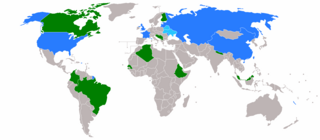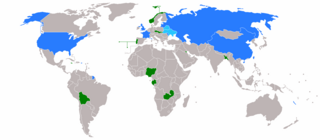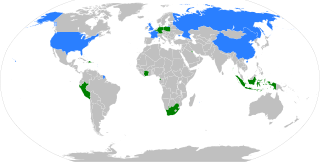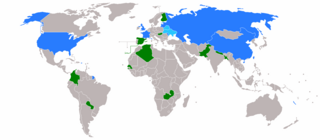Canada was a founding member of the United Nations, and was an original signatory of the Declaration by United Nations. At the signing of the Declaration by United Nations, Canada was one of four Dominions of the British Empire present, alongside Australia, New Zealand, and the Union of South Africa. In 1945, Canada was present at the United Nations Conference on International Organization and signed the Charter of the United Nations. McGill University professor John Peters Humphrey was the principal author of the first draft of the Universal Declaration of Human Rights.

The G4 nations, comprising Brazil, Germany, India, and Japan, are four countries which support each other's bids for permanent seats on the United Nations Security Council. Unlike the G7, where the common denominator is the economy and long-term political motives, the G4's primary aim is the permanent member seats on the Security Council. Each of these four countries have figured among the elected non-permanent members of the council since the UN's establishment. Their economic and political influence has grown significantly in the last decades, reaching a scope comparable to the permanent members (P5). However, the G4's bids are often opposed by the Uniting for Consensus movement, and particularly their economic competitors or political rivals.

Reform of the United Nations Security Council (UNSC) encompasses five key issues: categories of membership, the question of the veto held by the five permanent members, regional representation, the size of an enlarged Council and its working methods, and the Security Council-General Assembly relationship. The Member States, regional groups and other Member State interest groupings developed different positions and proposals on how to move forward on this contested issue.

The United Nations Regional Groups are the geopolitical regional groups of member states of the United Nations. Originally, the UN member states were unofficially organized into five groups as an informal means of sharing the distribution of posts for General Assembly committees. Now this grouping has taken on a much more expansive and official role. Many UN bodies are allocated on the basis of geographical representation. Top leadership positions, including Secretary-General and President of the General Assembly, are rotated among the regional groups. The groups also coordinate substantive policy and form common fronts for negotiations and bloc voting.

France has been a member of the United Nations (UN) since its foundation in 1945 and is one of the five countries, alongside China, Russia, the United Kingdom, and the United States, that holds a permanent seat on the United Nations Security Council (UNSC), which is responsible for maintaining international peace and security.

The 2006 United Nations Security Council election began on 16 October 2006 during the 61st session of the United Nations General Assembly, held at United Nations Headquarters in New York City. The elections were for five non-permanent seats on the Security Council for two-year mandates commencing on 1 January 2007.
Brazil is a founding member of the United Nations and participates in all of its specialized agencies. Brazil is among the twenty top contributors to United Nations peacekeeping operations, and has participated in peacekeeping efforts in the Middle East, the former Belgian Congo, Cyprus, Mozambique, Angola, and more recently East Timor and Haiti. Brazil has been regularly elected as a non-permanent member to the Security Council since its first session in 1946 and is now among the most elected UN member states to the UNSC. Brazil was voted to become a member of the 15-country UN Security Council for a two-year term, in 2022-23.

The 2014 United Nations Security Council election was held on 16 October 2014 during the 69th session of the United Nations General Assembly, held at United Nations Headquarters in New York City. The elections were for five non-permanent seats on the UN Security Council for two-year mandates commencing on 1 January 2015. In accordance with the Security Council's rotation rules, whereby the ten non-permanent UNSC seats rotate among the various regional blocs into which UN member states traditionally divide themselves for voting and representation purposes, the five available seats were allocated as follows:

The 2012 United Nations Security Council election was held on 18 October 2012 during the 67th session of the United Nations General Assembly, held at the Headquarters of the United Nations in New York City. The elections were for five non-permanent seats on the UN Security Council for two-year mandates commencing on 1 January 2013 to replace the five countries whose terms expired. The countries elected were Argentina, Australia, Luxembourg, the Republic of Korea, and Rwanda with Luxembourg being elected for the first time.

The 2011 United Nations Security Council election was held on 21 and 24 October 2011 during the Sixty-sixth session of the United Nations General Assembly, held at United Nations Headquarters in New York City. The General Assembly elected Azerbaijan, Guatemala, Morocco, Pakistan, and Togo, as the five new non-permanent members of the UN Security Council for two-year mandates commencing on 1 January 2012. Azerbaijan was elected after 17 rounds on 24 October, while the other four new members were chosen on 21 October.

The 1996 United Nations Security Council election was held on 21 October 1996 at United Nations Headquarters in New York City during the 51st session of the United Nations General Assembly. The General Assembly elected five non-permanent members of the UN Security Council for two-year terms commencing on 1 January 1997.

The 1988 United Nations Security Council election was held on 26 October 1988 during the Forty-third session of the United Nations General Assembly, held at United Nations Headquarters in New York City. The General Assembly elected Canada, Colombia, Ethiopia, Finland, and Malaysia, as the five new non-permanent members of the UN Security Council for two-year mandates commencing on 1 January 1989.

The 1976 United Nations Security Council election was held on 21 October 1976 during the Thirty-first session of the United Nations General Assembly, held at United Nations Headquarters in New York City. The General Assembly elected Canada, the Federal Republic of Germany, India, Mauritius, and Venezuela, as the five new non-permanent members of the UN Security Council for two-year mandates commencing on 1 January 1977. Both Mauritius and West Germany were elected members of the Council for the first time.

The 1978 United Nations Security Council election was held on 10 November 1978 during the Thirty-third session of the United Nations General Assembly, held at United Nations Headquarters in New York City. The General Assembly elected Bangladesh, Jamaica, Norway, Portugal, and Zambia, as the five new non-permanent members of the UN Security Council for two-year mandates commencing on 1 January 1979. Notably, Bangladesh, Jamaica and Portugal were elected members of the council for the first time.

The 2018 United Nations Security Council election was held on 8 June during the 72nd session of the United Nations General Assembly, held at United Nations Headquarters in New York City. The elections were for five non-permanent seats on the UN Security Council for two-year mandates commencing on 1 January 2019.

The 2020 United Nations Security Council election was held on 17 and 18 June 2020 during the 74th session of the United Nations General Assembly, held at United Nations Headquarters in New York City. The elections were for five non-permanent seats on the UN Security Council for two-year mandates commencing on 1 January 2021.

The 1968 United Nations Security Council election was held on 1 November 1968 during the Twenty-third session of the United Nations General Assembly, held at United Nations Headquarters in New York City. The General Assembly elected Colombia, Finland, Nepal, Spain, and Zambia, as the five new non-permanent members of the UN Security Council for two-year mandates commencing on 1 January 1969.
The Republic of Turkey is one of the 51 founding members of the United Nations when it signed the United Nations Conference on International Organization in 1945.
The 2026 United Nations Security Council election will be held in mid-2026 during the 80th session of the United Nations General Assembly, held at United Nations Headquarters in New York City. The elections are for five non-permanent seats on the UN Security Council for two-year mandates commencing on 1 January 2027. In accordance with the Security Council's rotation rules, whereby the ten non-permanent UNSC seats rotate among the various regional blocs into which UN member states traditionally divide themselves for voting and representation purposes, the five available seats are allocated as follows:















